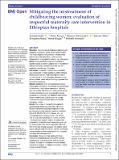| dc.contributor.author | Asefa, Anteneh | |
| dc.contributor.author | Morgan, Alison | |
| dc.contributor.author | Gebremedhin, Samson | |
| dc.contributor.author | Tekle, Ephrem | |
| dc.contributor.author | Abebe, Sintayehu | |
| dc.contributor.author | Magge, Hema | |
| dc.contributor.author | Kermode, Michelle | |
| dc.date.accessioned | 2022-08-25T16:27:46Z | |
| dc.date.available | 2022-08-25T16:27:46Z | |
| dc.date.issued | 2020-09-01 | |
| dc.identifier.citation | Asefa, A., Morgan, A., Gebremedhin, S., Tekle, E., Abebe, S.A., Magge, H., & Kermode, M. (2020). Mitigating the mistreatment of childbearing women: evaluation of respectful maternity care intervention in Ethiopian hospitals. BMJ Open, 10. | en_US |
| dc.identifier.other | DOI:10.1136/bmjopen-2020-038871 | |
| dc.identifier.other | Corpus ID: 221498075 | |
| dc.identifier.uri | https://repository.amref.ac.ke/handle/123456789/793 | |
| dc.description | © Author(s) (or their
employer(s)) 2020. Re-use
permitted under CC BY-NC. No
commercial re-use. See rights
and permissions. Published by
BMJ. | en_US |
| dc.description.abstract | Objectives There is a lack of evidence on approaches to mitigating mistreatment during facility-based childbirth. This study compares the experiences of mistreatment reported by childbearing women before and after implementation of a respectful maternity care intervention. Design A pre–post study design was undertaken to quantify changes in women’s experiences of mistreatment during facility-based childbirth before and after the respectful maternity care intervention. Intervention A respectful maternity care intervention was implemented in three hospitals in southern Ethiopia between December 2017 and September 2018 and it included training of service providers, placement of wall posters in labour rooms and post-training supportive visits for quality improvement. Outcome measures A 25-item questionnaire asking women about mistreatment experiences was administered to 388 women (198 in the pre-intervention, 190 in the post-intervention). The outcome variable was the number of mistreatment components experienced by women, expressed as a score out of 25. Multilevel mixed-effects Poisson modelling was used to assess the change in mistreatment score from pre-intervention to post-intervention periods. Results The number of mistreatment components experienced by women was reduced by 18% when the post-intervention group was compared with the pre-intervention group (adjusted regression coefficient (Aβ)=0.82, 95% CI 0.74 to 0.91). Women who had a complication during pregnancy (Aβ=1.17, 95% CI 1.01 to 1.34) and childbirth (Aβ=1.16, 95% CI 1.03 to 1.32) experienced a greater number of mistreatment components. On the other hand, women who gave birth by caesarean birth after trial of vaginal birth (Aβ=0.76, 95% CI 0.63 to 0.92) and caesarean birth without trial of vaginal birth (Aβ=0.68, 95% CI 0.47 to 0.98) experienced a lesser number of mistreatment components compared with those who had vaginal birth. Conclusions Women reported significantly fewer mistreatment experiences during childbirth following implementation of the intervention. Given the variety of factors that lead to mistreatment in health facilities, interventions designed to mitigate mistreatment need to involve structural changes | en_US |
| dc.description.sponsorship | Institute of Healthcare Improvement (IHI) through the Federal Ministry of Health,
Ethiopia, Melbourne Research
Scholarship (University of Melbourne), and the Population Health Investing in
Research Students’ Training (PHIRST) travel grant (Melbourne School of Population
and Global Health, University of Melbourne). | en_US |
| dc.language.iso | en | en_US |
| dc.publisher | BMJ Open | en_US |
| dc.subject | Mistreatment | en_US |
| dc.subject | Childbearing | en_US |
| dc.subject | Intervention | en_US |
| dc.subject | Ethiopia | en_US |
| dc.title | Mitigating the Mistreatment of Childbearing Women: Evaluation of Respectful Maternity Care Intervention in Ethiopian Hospitals | en_US |
| dc.type | Article, Journal | en_US |

